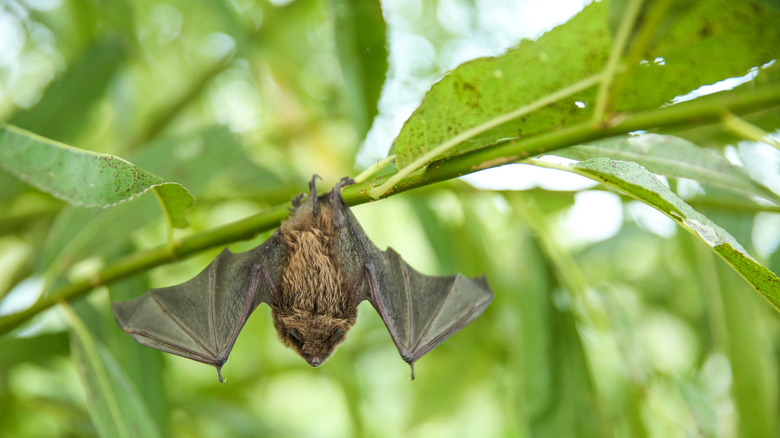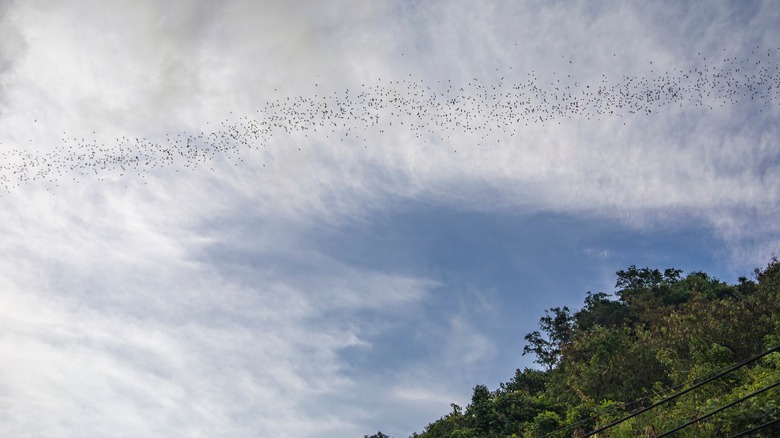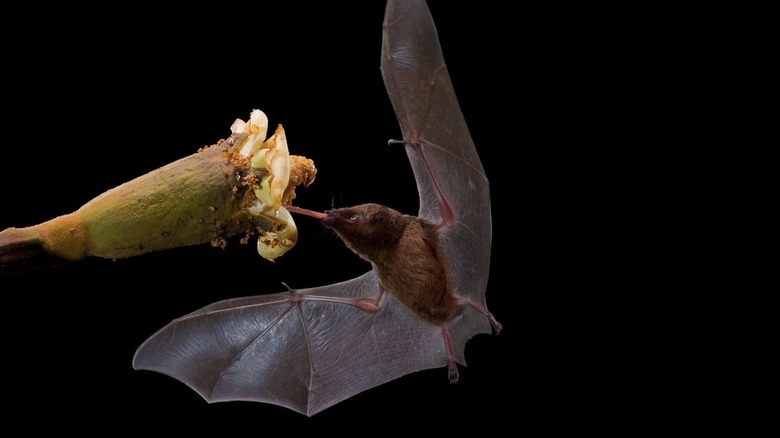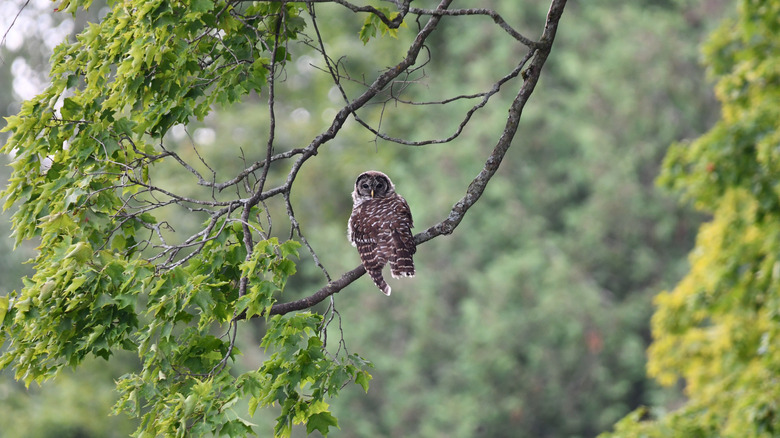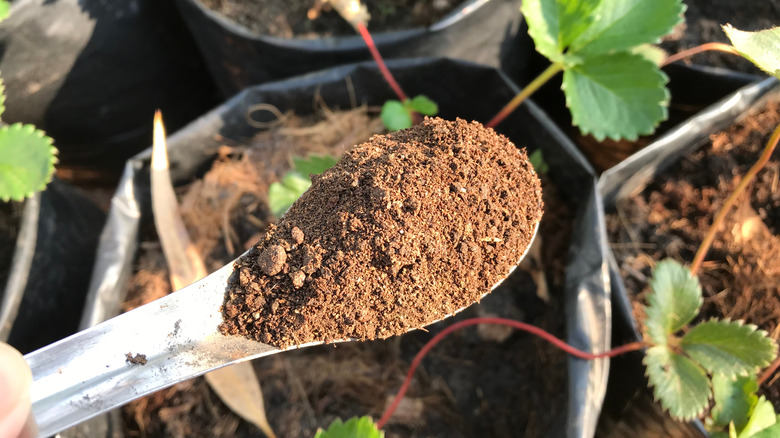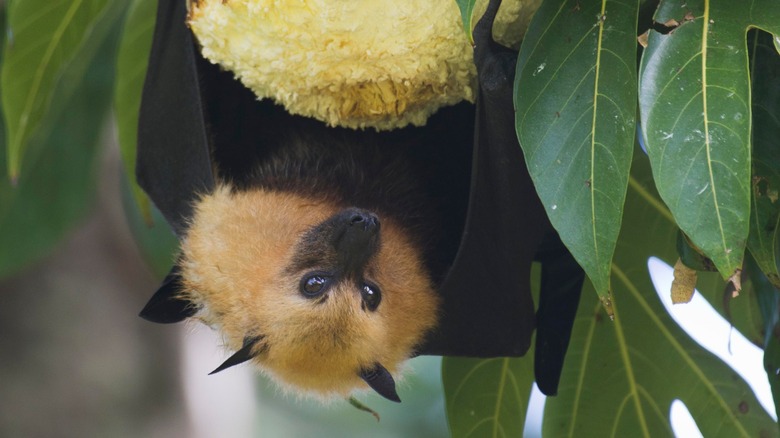Why Bats Are A Good Thing To See Around Your Garden
We may receive a commission on purchases made from links.
If you like to enjoy an occasional margarita while relaxing outdoors on a patio, you may not realize that a bat should take credit for making such an occasion possible. One of the ingredients of tequila is agave, and the only animal responsible for pollinating this plant is a bat. In fact, these small animals make many contributions to the health and enjoyment of daily life that are not well known. In addition to being pollinators, they also consume an enormous amount of insects every evening. They also disperse seeds and supply a rich form of fertilizer for plants. These are just a few of the reasons why you should feel lucky if bats decide to roost near your garden.
Bats have undoubtedly been associated with all kinds of negative correlations, such as vampires at Halloween or as potential carriers of rabies. The truth is that they are shy little creatures that prefer not to interact with people, and they are far less likely to be the source of a disease such as rabies than a skunk or raccoon. They are not rodents but mammals that belong to the Chiroptera order. While some bats in North America eat nectar, most of them are insectivores, and their primary goal in life is to eat as many insects as possible. For a gardener, having a bat in your garden is one of the best ways to keep it healthy and thriving.
They provide insect control
Bats are a powerful force when it comes to insect control, and they represent nature's best form of organic pesticide. According to Dr. Merlin Tuttle, ecologist and bat specialist, they play a critical role in controlling the insect population of the world that could otherwise have a catastrophic effect on plant production, per Texas Monthly. "Bats are absolutely essential to the ecological and economic health of the world," Tuttle explained. "Here in Texas, for instance, they feed on moths whose larvae threaten corn and tobacco. They save millions of dollars in pesticide application." He pointed out that the large colony of Mexican free-tailed bats that famously take up residence in Austin can eat up to 10 tons of insects each night. In fact, a single bat can eat 1,000 mosquitos in one hour.
All of this nightly activity improves the health of the ecosystem and reduces money spent on artificial pesticides. According to Merlin Tuttle's Bat Conservation, farmers in the U.S. are able to save an estimated $23 billion each year in agricultural losses due to the activity of insect-eating bats. One farmer in California notes that the bats on his property regularly consume moths that would destroy his crop, protecting his investment in a natural way that is free of charge, per The Guardian. This kind of example demonstrates how beneficial bats can be in your own backyard as they protect the plants growing in your garden.
Bats are pollinators
The thought of flower pollinators brings to mind a grassy meadow filled with the buzzing of bees or the sight of hummingbirds fluttering from one wildflower to the next. While these traditional images of pollination take place during the daytime, many plants only bloom at night. For this reason, nectar-loving bats play a critical role as the primary pollinators for over 67 plant families and 500 species of flowers. For example, the Mexican long-nose bat is a pollinator that lives in Texas, New Mexico, Arizona, and California. This little animal will travel far to find its favorite plants, which include peach trees and agave plants. A pollinating bat has a longer muzzle that can reach inside a flower to retrieve the nectar, and as it does so, it collects pollen on its face and body. These animals can collect a great deal of pollen on their furry forms, and they may stop by as many as 30 flowers each night, which is how they can impact cross-pollination between plants.
A bat's sense of echolocation is useful in helping the animal locate certain flowers. For example, flowers with buds that extend from the stalk — such as those of the baobab tree — are easy for bats to locate using their navigation skills. Elsewhere, flowers with bell-shaped blooms also help bats pinpoint their location by echoing the noises that the animals emit as they fly.
They're a food source for hawks and owls
Bats are also beneficial to the rest of the ecosystem that supports your garden's health. They will occasionally be eaten by other animals that help your garden thrive. For example, hawks and owls occasionally prey on bats, but they also eat the rodents that damage your flowers and vegetables. These birds will hunt any rats, squirrels, or rabbits that love to chew through your plants and ruin your hard work. In fact, an owl can kill as many as 12 mice in one night. Even the presence of one of these birds will deter rodents from coming near your yard. If hawks and owls identify bats as another source of food, it will encourage them to stay in the area and keep your garden free of pests.
It's helpful to rid your yard of rodents because they are responsible for a wide array of garden damage. Not only will they destroy the young plants that are still growing, but they will also ruin any food that is stored nearby. They can do great harm by chewing through electrical wires and wreak havoc underground by building tunnels, which create uneven surfaces for patios and sidewalks. As an additional food source for hawks and owls, bats indirectly can help eradicate much of the damage that these rodents would do if there were no predators nearby.
Their guano is excellent fertilizer
Another way that bats can contribute to the health of your garden is when you use their droppings as fertilizer. Bat guano is generally identified as NPK 10-3-1, which represents 10 percent nitrogen (N), 3 percent phosphorus (P), and 1 percent potassium (K). The rich nutrients in the fertilizer benefit your plants in several ways. The nitrogen helps your lawn grow quickly and stay green, the phosphorous nurtures the growth of flowers and roots, and the potassium sustains the general well-being of the plants in the garden. Bat guano also helps to condition the soil, acts as a fungicide, and helps with soil drainage.
Different varieties of bat guano can be purchased as fertilizer for your lawn, such as this Down to Earth Organic Bat Guano Fertilizer Mix from Amazon. Some who have purchased this particular product rave about how rich it is, appreciate its organic nature, and mention what a difference it makes in the growth of their plants. One person suggested that their flowers were blooming more than usual, and another reviewer claimed that their plants grew 10 times more than they normally would. Because it's so concentrated, the company recommends steeping 1 or 2 tablespoons of the product with a gallon of water for 48 hours to create a liquid that can be added to the soil or used as a foliar spray.
Bats help with seed dispersal
Another way that bats contribute to the environment is through seed dispersal. The guano of fruit-eating bats contains seeds from the foods that they consume, and their droppings help with the distribution of new growth. In fact, some bats scatter seeds many miles away from the original source of food, which has shown to be particularly effective in encouraging the growth of new plants.
While the significance of this type of contribution to the world of agriculture is beginning to be recognized more often, the unfortunate reality is that many bat species are losing their habitats and are in decline. As a result, one recent trend that has become popular is installing a bat box on your property to encourage these small animals to take up residence. These wooden houses are designed to attract these animals by offering them a safe place to roost. Indeed, a bat box allows them to rest during the day before launching out on their quest for insects or nectar in the evening. Experts recommend choosing a light-colored box with several chambers and mounting it in a spot where it won't become too hot. These animals can become overheated in a box that receives too much sun, which can easily threaten the life of the colony inside. By offering them a place to live and becoming more aware of the benefits they bring to your yard, you'll find that bats can really help your garden thrive.
